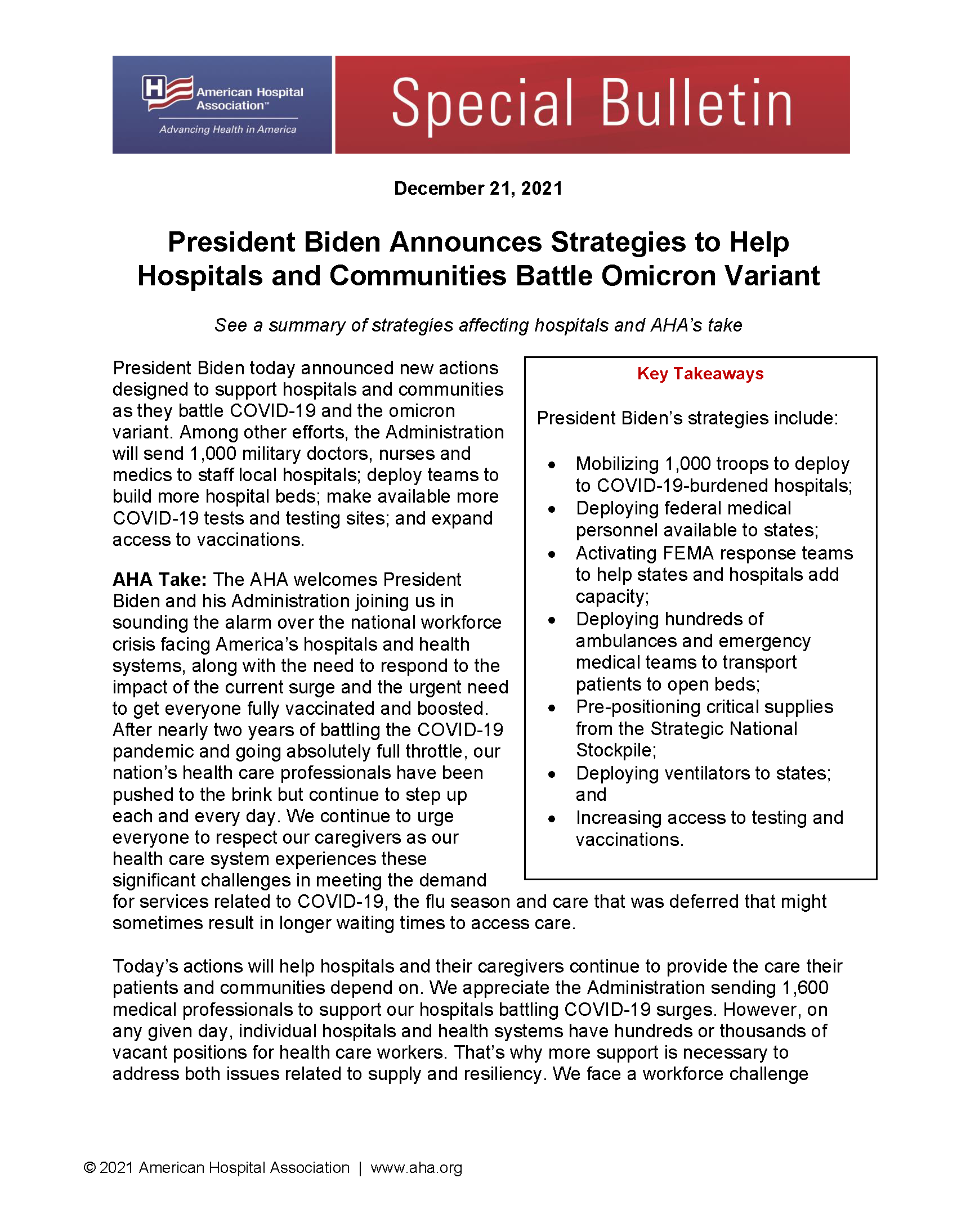President Biden Announces Strategies to Help Hospitals and Communities Battle Omicron Variant
Special Bulletin
December 21, 2021
See a summary of strategies affecting hospitals and AHA’s take
President Biden today announced new actions designed to support hospitals and communities as they battle COVID-19 and the omicron variant. Among other efforts, the Administration will send 1,000 military doctors, nurses and medics to staff local hospitals; deploy teams to build more hospital beds; make available more COVID-19 tests and testing sites; and expand access to vaccinations.
AHA Take
The AHA welcomes President Biden and his Administration joining us in sounding the alarm over the national workforce crisis facing America’s hospitals and health systems, along with the need to respond to the impact of the current surge and the urgent need to get everyone fully vaccinated and boosted. After nearly two years of battling the COVID-19 pandemic and going absolutely full throttle, our nation’s health care professionals have been pushed to the brink but continue to step up each and every day. We continue to urge everyone to respect our caregivers as our health care system experiences these significant challenges in meeting the demand for services related to COVID-19, the flu season and care that was deferred that might sometimes result in longer waiting times to access care.
Today’s actions will help hospitals and their caregivers continue to provide the care their patients and communities depend on. We appreciate the Administration sending 1,600 medical professionals to support our hospitals battling COVID-19 surges. However, on any given day, individual hospitals and health systems have hundreds or thousands of vacant positions for health care workers. That’s why more support is necessary to address both issues related to supply and resiliency. We face a workforce challenge unlike any we have experienced in at least the past several generations and, if we are to meet this challenge, we must form stronger and deeper public private partnerships.
We continue to urge the Administration to use all available tools at their disposal and not leave any resources or support on the sidelines. For example, we continue to call for the release of billions of dollars that are remaining in the Provider Relief Fund as the Administration has not released any funding to help hospitals contend with the delta variant and COVID-19 surges that have occurred since April. In addition, more transparency regarding the availability of therapeutics – those already approved and those awaiting approval – will help our hospitals and health systems to plan for the next chapter in this pandemic story.
Finally, we reiterate our call for all eligible Americans to get vaccinated and boosted as soon as they can in order to protect themselves, their families and their communities against the worst effects of the virus.
More details of the Administration’s strategies follow. Additional details are included in the Administration’s fact sheet.
Support for Hospitals and Health Systems and Enhanced Testing and Vaccinations
Deploying Additional Medical Personnel
The President is directing the Defense Secretary to ready an additional 1,000 military doctors, nurses, paramedics, and other medical personnel to deploy to hospitals during January and February. In addition, six emergency response teams — with more than 100 clinical personnel and paramedics — are deploying now to six states: Michigan, Indiana, Wisconsin, Arizona, New Hampshire and Vermont. This is on top of the 300 federal medical personnel that have already been deployed.
Expanding Hospital Capacity
The Federal Emergency Management Agency (FEMA) will work with states and territories to assess hospital needs and to start expanding hospital bed capacity now — with the federal government paying for all of it. The Administration also is pre-positioning the federal government’s own supplies and resources to help make more beds available. In addition, FEMA is ready to deploy hundreds of ambulances and emergency medical teams so that if one hospital fills up, they can transport patients to open beds in other facilities.
Providing Critical Supplies
The Administration has prepositioned supplies from the Strategic National Stockpile — masks, gloves, gowns, and ventilators — to send to states when they need them.
Increased Access to Testing
The Administration will stand up new federal testing sites; distribute free, rapid at-home tests; and use the Defense Production Act and other authorities to produce as many tests as quickly as possible.
Expanding Capacity for Vaccinations
Efforts include FEMA standing up new pop-up vaccination clinics across the country; deploying hundreds of federal vaccinators across 12 states, Tribes and territories; and scaling pharmacy capacity.
Further Questions
If you have questions, please contact AHA at 800-424-4301.
Key Takeaways
President Biden’s strategies include:
- Mobilizing 1,000 troops to deploy to COVID-19-burdened hospitals;
- Deploying federal medical personnel available to states;
- Activating FEMA response teams to help states and hospitals add capacity;
- Deploying hundreds of ambulances and emergency medical teams to transport patients to open beds;
- Pre-positioning critical supplies from the Strategic National Stockpile;
- Deploying ventilators to states; and
- Increasing access to testing and vaccinations.


